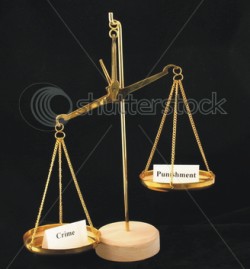Crime & Punishment
Criminal misappropriation of property
 Under section 403 of the Penal Code, A person commits “criminal misappropriation” if he (i) dishonestly misappropriates or converts to his own use (ii) any movable property.
Under section 403 of the Penal Code, A person commits “criminal misappropriation” if he (i) dishonestly misappropriates or converts to his own use (ii) any movable property.
Punishment: Imprisonment of either description for two years or fine or both.
Illustrations:
A, being on friendly terms with Z, goes into Z's library in Z's absence and takes away a book without Z's express consent. Here, if A was under the impression that he had Z's implied consent to take the book for the purpose of reading it, A has not committed theft, he is guilty of an offence under this section.
Explanation 1 to section 403 provides that a dishonest misappropriation for a time only is a misappropriation within the meaning of this section.
Explanation 2 to this section provides that a person who finds property not in the possession of any other person, and takes such property for the purpose of protecting it for, or of restoring it to, the owner, does not take, or misappropriate it dishonestly, and is not guilty of an offence; but he is guilty of an offence defined above, if he appropriates it to his own use, when he knows or has the means of discovering the owner, or before he has used reasonable means to discover and give notice to the owner and has kept the property for a reasonable time to enable the owner to claim it.
What are reasonable means or what is a reasonable time in such a case, is a question of fact.
It is not necessary that the finder should know who is the owner of the property, or that any particular person is the owner of it, it is sufficient if, at the time of appropriating it he does not believe it to be his own property, or in good faith believes that the real owner cannot be found.
It would thus appear that the two main ingredients of the offence of criminal misappropriation are:
-Dishonest misappropriation or conversion of property person's own use and
-Such property must be movable.
In the case of Bhagiram Dome v. Abar Dome, ( 1888) 1.K.R.15 Cal.388, 400 It has been observed that Criminal Misappropriation takes place when the possession has been innocently come by, but where, by a subsequent change of intention, or from the knowledge of some new fact with which the party was not previously acquainted, the retaining becomes wrongful and fraudulent.
The offence consists in the dishonest misappropriation or conversion, either permanently or for a time, of property which is already without wrong in the possession of the offender.
Source: Penal Code by L. Kabir.